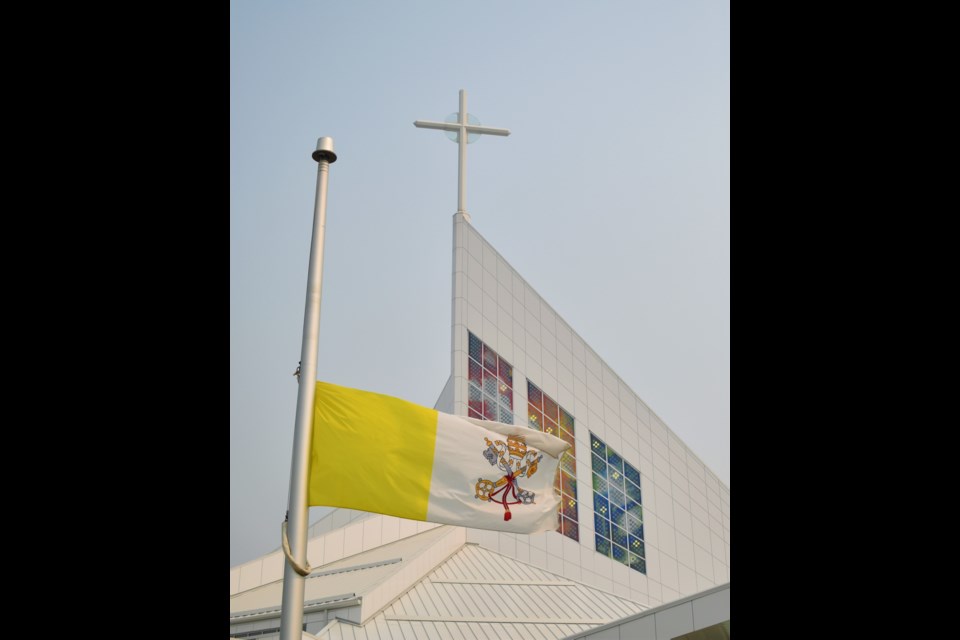SASKATOON — Former Truth and Reconciliation Commissioner Chief Wilton Littlechild will be among the 13 people from the Assembly of First Nations that will be part of the Canadian delegation scheduled to meet with Pope Francis in the Vatican next month. More than 30 Indigenous peoples will be joining the trip when they meet the pontiff from Dec. 17-20.
The Canadian Conference of Catholic Bishops has yet to release the names of their members that will accompany the delegation.
Representatives will include First Nations, Inuit, and Métis elders, knowledge keepers, residential school survivors, and youth as part of the delegation, according to an earlier report on CCCB.ca, the official website of Canada’s national assembly of bishops.
The itinerary and other details — including the final roster of delegates that will include 30 to 35 representatives from various Indigenous groups — of the four-day meeting have yet to be finalized. The CCCB will shoulder all travel costs of the trip, including accommodations.
The Catholic Register has reported that Littlechild, who is also a residential school survivor, will be the AFN’s official spokesperson when they meet the pope between 10 a.m. to 11 a.m. of Dec. 20 (local time).
Littlechild is expected to present the TRC’s Call to Action #58 from the TRC's final report, calling for the pope to issue an apology to the survivors, families and communities of First Nations, Inuit and Métis children who suffered abuse — cultural, emotional, physical sexual, and spiritual — during their stay in Catholic-run residential schools.
“We call for that apology to be similar to the 2010 apology issued to Irish victims of abuse and to occur within one year of the issuing of this Report and to be delivered by the Pope in Canada,” as stated on the final report of the TRC. The pope has yet to issue an apology.
Former CCCB president Most Rev. Lionel Gendron, in a letter in 2018, stated that Pope Francis knows and takes seriously the final report of the TRC but could not personally respond to Call to Action #58.
Spiritual advisor and Anishinaabe elder Fred Kelly, former AFN Grand Chief Phil Fontaine, and Northwest Territories executive committee member Norman Yakeleya of the Dene people are the other members of the AFN delegation that will join Littllechild to the Vatican trip. Current AFN national Chief RoseAnne Archibald will not be part of the delegation.
The Inuit delegation will be the first to meet with Pope Francis on the day of his 85th birthday on Dec. 17, while the delegates from the Métis group will get the chance to talk to the Holy Father the following day. Both meetings are scheduled at 11 a.m., Rome time.
The delegation will also get the chance to visit the Vatican museum, where they can see Indigenous art from around the world in the Anima Mundi collection. Separate tours to visit the Basilicas of St. John Lateran and St. Maria Maggiore in Rome, and St. Peter’s in Vatican City are part of the week-long itinerary.
Canada’s Charges d’Affaires Paul Gibbard, the country’s representative to the Holy See, will also meet the delegation.
Meeting to exceed one hour
Vatican observers are saying that Pope Francis’ meeting with the Canadian delegation could exceed the hour-long general audience typicially done by the pontiff. The Holy Father’s face-to-face conversation with Indigenous delegates could be at least three hours.
St. Mark’s College principal and Corpus Christi College president Michael Higgins, a long-time Vatican observer, believes that First Nations, Inuit, and Métis representatives would get more time meeting Pope Francis.
“[Pope Francis] tends to exceed the time limits allocated. He doesn’t disrupt the dynamic if he feels the presence of the Spirit.”
Neil MacCarthy, who is the CCCB’s communications person for the Vatican trip, said heads of state usually gets 15 to 30 minutes when they make short visits to meet the pope.
“Allocating hour-long individual meetings with First Nations, Métis and Inuit delegates, as well as a final audience with all delegates, is a significant commitment.”
He added that the delegation could present Pope Francis with “dossiers of information” to make full use of the time the Holy Father will spend talking with residential school survivors and other members of the group. The dossiers could be presented before or after the meeting.
“We must remember that the December meetings will provide a foundation for the papal visit to Canada,” said MacCarthy. The Vatican has also confirmed that Pope Francis will be making a “pilgrimage of healing and reconciliation” to repair the strained relations between the Catholic Church and Indigenous people in Canada sometime next year.
Details of the papal visit are still being discussed with the date to be set later, according to a Vatican statement. The statement added that Pope Francis expressed his “willingness” to visit Canada as part of moves by the Church to reach out to Indigenous people.
Former Salt and Media chief executive officer Fr. Tom Rosica, who acted as Vatican’s spokesperson in past synods and other events, said the pope’s meeting is remarkable based on the time he committed to talk to each delegation for the four-day trip.
“The fact that the Pope is granting that amount of time at that moment in December is extremely important. It’s not a small amount of time,” Rosica said.






